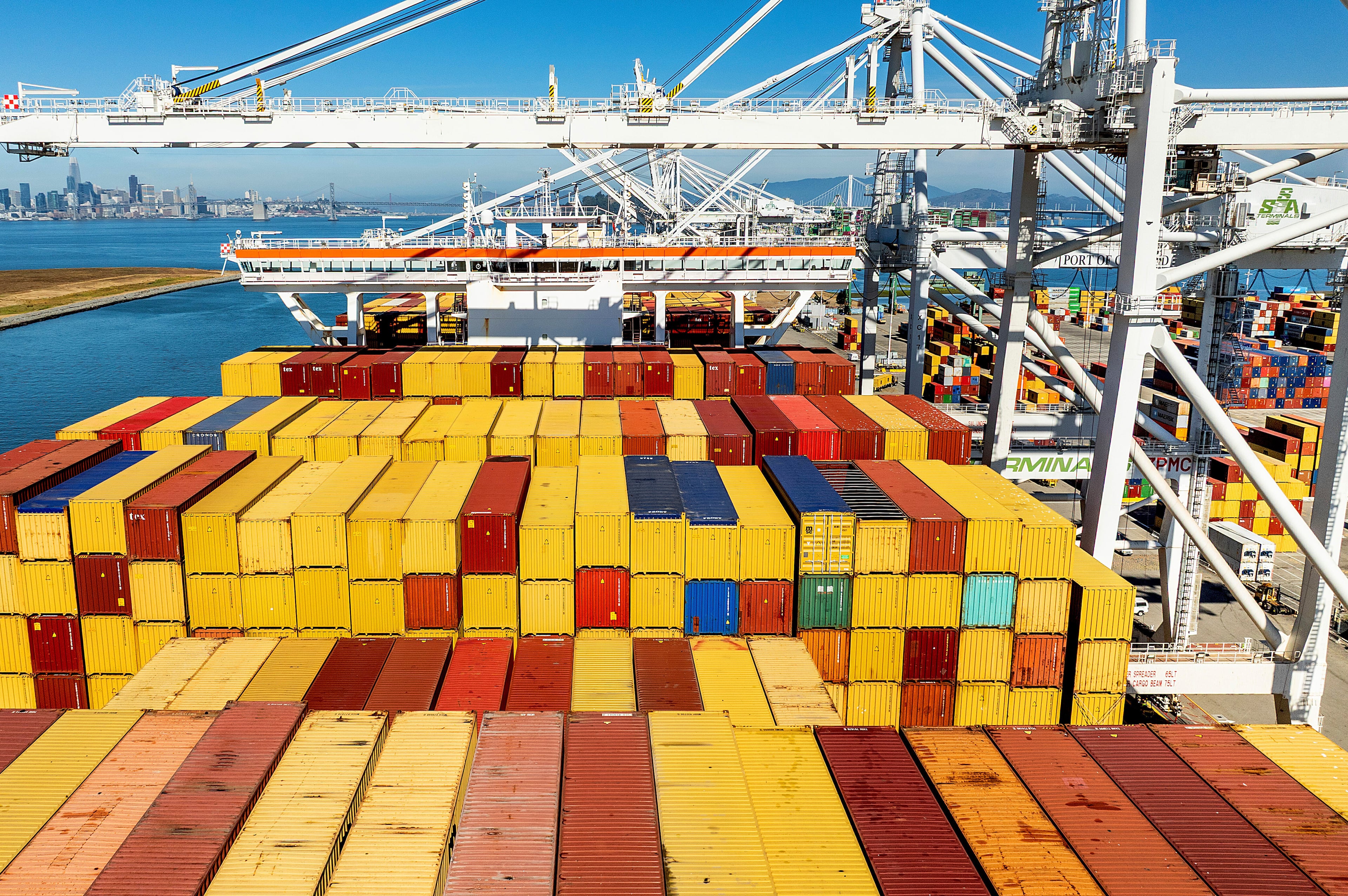Looming tariff deadline could bring clarity and more costs for Georgians

As President Donald Trump’s Friday deadline looms to strike framework pacts with top foreign trade partners, the White House has touted deals that would seemingly cement import taxes on overseas goods for the foreseeable future.
Georgia businesses now have at least some clarity about the future and what imported goods will cost. But how the deals will affect the broader economy as well as business and consumer sentiment in the months ahead remains unclear.
The Federal Reserve kept its benchmark rates unchanged this week as it buys more time to determine what effect tariffs will have on inflation and employment.
“Changes in trade policies are impacting global trade and demand. It will likely all settle down at some point, but for now, it is a very volatile environment,” said UPS CEO Carol Tomé during an investor conference call Tuesday on the Sandy Springs-based shipping giant’s quarterly financial results.
In the run-up to Friday’s deadline, Trump has announced a slew of new framework agreements with some of Georgia’s key partners, including the European Union and the United Kingdom. Agreements with South Korea and Japan would set tariffs on goods from those countries at 15%. South Korea is Georgia’s third-largest source of imported goods, and Japan is the sixth.
But agreements as of late Thursday remained unsettled for top trade partners such as Canada and China. Trump has warned sweeping tariffs could come Friday against the goods of many countries if framework deals aren’t in place.
Late Thursday, Trump signed an executive order hitting dozens of countries with tariffs ranging from 10% to 41%, Reuters reported. The New York Times reported the levies will take effect Aug. 7.
“After Aug. 1, if a 15% tariff becomes the general benchmark, it will have a tangible effect on business activity and a noticeable impact on consumer prices,” Sina Golara, assistant professor of supply chain management at Georgia State University’s Robinson College of Business, said in a statement. “As households pay more for certain goods, they will inevitably cut back on other purchases, creating a drag on overall demand and economic growth.”
Trump’s tariff strategy is a stark departure from trade policies in recent decades that favored freer movement of goods and services among nations.
The president’s power to impose tariffs still faces legal challenges in federal court. A U.S. appeals court on Thursday was set to hear arguments in two cases brought by U.S. business and state leaders, who hope to invalidate many of the president’s tariffs. Several other lawsuits are pending that claim Trump has overstepped his authority.
Tariffs are a tax on all imported goods. Companies that bring foreign goods into the U.S. pay the tax. Though, with higher tariffs, increased costs are likely to be passed on to U.S. businesses and consumers.
The new trade war has hit a litany of products globally, including heavy taxes on foreign-made steel, aluminum and autos.
So far, the tariffs have not made a huge difference in gauges of inflation as companies have been front-running imposition of the taxes and, in other cases, largely avoiding passing costs onto their customers.
“Now, I think there’s a realization that tariffs are going to be significantly higher,” said Daniel Altman, economist and founder of High Yield Economics. “So the question is, when are companies going to be raising their prices. They can’t keep eating these tariffs forever.”
Hiking prices, though, could cause a company to lose market share, he said. “As a result, we’re seeing companies feel each other out to see when they’re going to raise prices.”
Absorbing the costs, though, can mean fewer dollars to invest in new products, services or personnel.
Atlanta-based children’s apparel and accessories maker Carter’s said it is raising prices as one strategy to combat tariffs. It will also change its product assortment, alter its mix of production by country and share some costs with its vendors.
“It’s clear we’re navigating an unsettled world and marketplace,” Richard Westenberger, chief financial officer of Carter’s, said in a quarterly earnings call last week.
Carter’s paid about $110 million in duties on imported products in 2024. Now, it estimates another gross earnings impact of $125 million to $150 million each year with additional tariffs.
“A lot of my clients stockpiled some critical raw materials to act as a buffer and buy them time,” said Katie Deutschler, a partner and manufacturing specialist at Moore Colson, an Atlanta-based accounting and advisory firm.
A lot of Georgia manufacturers are small, so it’s a challenge to reconfigure supply chains and absorb price shocks, Deutschler said. Plus, the far-reaching tariff negotiations make planning long term difficult.
“It’s good to diversify,” she said of supply networks. “But what country is going to get tariffed next?”
Altman with High Yield Economics said he sympathizes with managers and executives who are dealing with the constant changes.
“They’ve had to keep up with the White House’s every decision, even when they have goods on the water,” he said. “And they don’t know how much they’re going to have to pay for those goods when they reach port.”
Arden’s Garden CEO Leslie Zinn said she’s felt like she’s “on a seesaw” this year, constantly trying to figure out the cost of her goods.
The Atlanta-based juice, smoothie and vegan snack company sources many of its fruits from overseas to serve its 19 retail locations. The company has so far absorbed higher costs and bought larger amounts of inventory. But Zinn said it’s unclear how long the company can sustain current pricing.
On Thursday, Trump extended the deadline for a tariff deal with Mexico for another 90 days. He has threatened tariffs of 30% on Mexican goods entering the U.S.
That kind of tariff on Mexico would be “unbelievably difficult for us,” Zinn said. Arden’s Garden gets key ingredients from Mexico, including citrus, mangoes and strawberries. If proposed tariffs on Mexico go into effect, she could have to raise prices 10% to 15%.
But Zinn called that her “last option.” She recounted stories of her mother and company founder, Arden Zinn, who was on a mission to spread health and wellness.
“We’re trying so hard to make health available to everybody,” Zinn said.
Foreign goods in Georgia
Georgia companies and consumers buy many imported goods that would be subject to various tariffs. Here are the top countries and the amount of goods they sell in Georgia.
Top Import Markets
- Mexico: $18.6 billion
- China: $17.2 billion
- South Korea: $16.6 billion
- Germany: $11.8 billion
- Vietnam: $6.7 billion
- Japan: $6.6 billion
- Canada: $6.5 billion
- Thailand: $5.5 billion
- India: $4.7 billion
- United Kingdom: $4.3 billion
Source: Georgia Department of Economic Development for 2024.
Editor’s note: This story has been updated to reflect executive action taken by President Donald Trump after initial publication of this article.




